
Review: Competence to flower
Plant Science Research Weekly, Research0 Comments
/
The transition between vegetative and reproductive stages in the plant life cycle implies a change in the developmental program of the shoot apical meristem to stop developing leaves and start developing floral buds. The factors that allow this transition to happen are many and the underlying mechanisms…

It was a Great, Green Year: Identification of a Chlorophyll Dephytylase That Functions in Chlorophyll Turnover
Research, The Plant Cell, The Plant Cell: In BriefIN BRIEF by Jennifer Mach [email protected]
Green may have been the Pantone Color of the Year for 2013 (http://www.pantone.com/color-of-the-year-2013), but 2016 was a great year for papers on chlorophyll research, at The Plant Cell and beyond. In this year, we saw a pile of interesting papers examining…
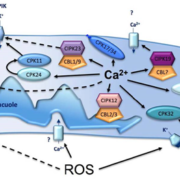
Previewing Pollen Biology special issue of Plant Physiology
Plant Science Research Weekly, ResearchIn Plant Physiology Preview you can get a head start on reading the excellent set of articles from a forthcoming special issue on Pollen Biology. Updates and research articles cover all aspects of this crucial part of reproductive biology, from the complex cell biology that underpins polar growth of…
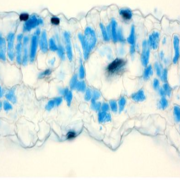
Best of 2016: Top Topics in The Plant Cell journal
Blog, Research, Research Blog, The Plant CellWe’ve highlighted some of the Plant Cell papers that were widely shared, liked, blogged, retweeted and otherwise garnered high-levels of attention this year. Perhaps you can use some holiday-season quiet time to catch up on those you missed.
Reviews and Perspectives
Creating order from chaos: epigenome…
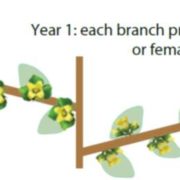
The Power of Plasticity in Polyploid Persimmon
Research, The Plant Cell, The Plant Cell: In BriefIN BRIEF by Jennifer Lockhart [email protected]
Most plants are hermaphrodites, producing perfect flowers with both male and female functions. In roughly 6% of plants, however, male (usually XY) plants produce only male flowers and female (XX) plants produce only female flowers. These dioecious plants…
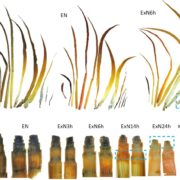
Best of 2016: Top Topics in Plant Physiology jounal
Blog, Research, Research Blog
We’ve highlighted some of the Plant Physiology papers that were widely shared, liked, blogged, retweeted and otherwise garnered high-levels of attention this year. Perhaps you can use some of that holiday-season quiet time to catch up on those you missed.
The breakaway attention-getter from Plant…
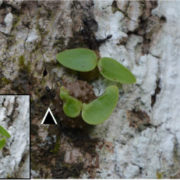
Plant farming by ants ($)
Plant Science Research Weekly, ResearchFarming mutualisms, in which an organism benefits from another to promote growth, have evolved in many lineages. In particular, symbioses between plants and ants are mostly defensive mutualisms. In this paper, Chomicki and Renner describe the obligate mutualism observed between epiphytes in the genus…

Bacteria lower surface tension in pitcher plant traps, trapping prey more efficiently ($)
Plant Science Research Weekly, ResearchPitcher plants are carnivorous, similar to Venus fly traps. However, pitcher plants have fluid-filled modified leaves instead of the movable lobes found on Venus fly traps. The pitcher plant’s modified leaf contains bacteria-laden water that traps small insects, but how are the insects trapped…
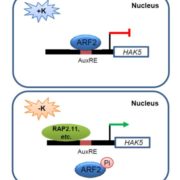
Transcriptional repression of K+ uptake by ARF2
Plant Science Research Weekly, ResearchHAK5 is a high-affinity potassium transporter that is transcriptionally repressed in high K+ conditions. Zhao et al. identified hormone-related cis-elements in the HAK5 promoter. They screened mutants deficient in transcription factors associated with these cis-elements and found that arf2 mutants show…

